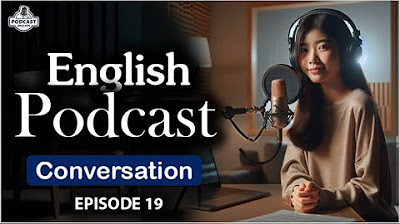Powerful Podcasts for English Fluency | Episode 11
Summary
TLDRIn this episode of EnglishPod, hosts Marco and Erica introduce learners to the art of small talk, focusing on everyday conversations with acquaintances or strangers. They dissect a dialogue between two characters, highlighting phrases like 'barely even,' 'did you catch,' 'by the way,' and 'take the stairs.' The hosts explain the usage of these phrases in context, providing examples to enhance understanding. The lesson aims to equip English learners with practical language skills for engaging in small talk, emphasizing the importance of such interactions in daily life.
Takeaways
- 😀 The podcast 'English Pod' provides English lessons for learners at different levels, focusing on everyday language.
- 🗣️ The episode emphasizes the importance of 'small talk', which are brief conversations with people you don't know well.
- 👂 The dialogue in the podcast is designed to be fast-paced to mimic real-life conversations, but it's slowed down for easier understanding.
- 🏙️ The script includes a dialogue set in an elevator, highlighting common small talk topics like the weather and news.
- 🧩 The term 'barely even' is introduced as a phrase used to emphasize the difficulty of an action, similar to 'almost couldn't'.
- 📰 'Catch' is used in the context of hearing or seeing something, like news or a game, and can be applied in various scenarios.
- 🔔 'By the way' is a phrase used to introduce a new or unrelated topic in the middle of a conversation.
- 🏢 The dialogue includes a humorous misunderstanding about a daughter being mistaken for a wife, illustrating the potential pitfalls of small talk.
- 🏋️♂️ 'Take the stairs' is a phrase that means to go up the stairs, not to take them somewhere else, and is used in the context of leaving the elevator.
- 📈 The podcast offers language patterns for small talk, such as 'It sure is [adjective]', which can be used to emphasize a point.
- 🤝 The phrase 'Yeah, it's [adjective] all right' is used to agree with a statement made by someone else during small talk.
Q & A
What is the main topic of the English Pod lesson discussed in the transcript?
-The main topic of the English Pod lesson is 'Small Talk', which refers to casual conversations with people you don't know well.
How does the dialogue in the lesson start?
-The dialogue starts with a greeting and a comment on the weather, specifically how cold it is in the morning.
What is the meaning of the phrase 'barely even' as used in the lesson?
-The phrase 'barely even' is used to emphasize that something is almost to the point of not happening, similar to 'almost couldn't' or 'almost nothing'.
What does the term 'catch' mean in the context of the dialogue?
-In the dialogue, 'catch' is used to ask if someone has heard or seen something, like news or an event.
How is the phrase 'by the way' used in the conversation?
-The phrase 'by the way' is used to introduce a new point or topic that may or may not be related to the current conversation.
What does 'take the stairs' mean in the dialogue?
-In the dialogue, 'take the stairs' means to physically go up the stairs, not to take them somewhere else.
What is the purpose of the 'Language Takeaway' section in the lesson?
-The 'Language Takeaway' section provides key words and phrases from the dialogue, explaining their meanings and usage in everyday conversations.
How does the dialogue demonstrate the use of the phrase 'it sure is'?
-The dialogue uses 'it sure is' to emphasize agreement with a statement, such as 'it sure is cold this morning'.
What is the function of the phrase 'did you happen to' in the dialogue?
-The phrase 'did you happen to' is used to inquire if someone has done something by chance, like 'did you happen to watch the football game?'
What is the significance of the character Mr. Anderson leaving the elevator in a hurry?
-Mr. Anderson leaving the elevator in a hurry signifies that he did not want to continue the conversation and found it annoying.
How does the lesson encourage learners to practice small talk?
-The lesson encourages learners to practice small talk by providing patterns and structures for common conversation starters and responses.
Outlines

This section is available to paid users only. Please upgrade to access this part.
Upgrade NowMindmap

This section is available to paid users only. Please upgrade to access this part.
Upgrade NowKeywords

This section is available to paid users only. Please upgrade to access this part.
Upgrade NowHighlights

This section is available to paid users only. Please upgrade to access this part.
Upgrade NowTranscripts

This section is available to paid users only. Please upgrade to access this part.
Upgrade NowBrowse More Related Video

EnglishPod 214 - Describing Personalities

English Learning Podcast Conversation Episode 19 | Beginners | Season 2

English Learning Podcast Conversation Episode 3 | Elementary | Podcast To Improve English Speaking

English Learning Podcast Conversation | English Podcast For Advanced | Episode 17

Learn English quickly with podcast | English learning Conversation | Episode 1

English Learning Podcast Conversation Episode 10 | Elementary | Easy Podcast For Learning English
5.0 / 5 (0 votes)